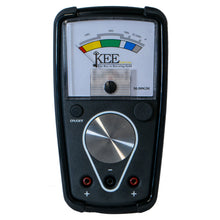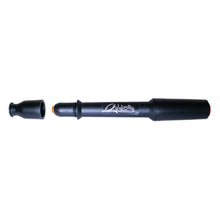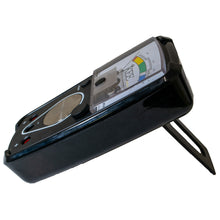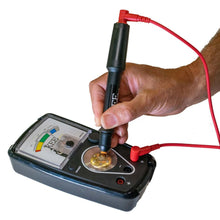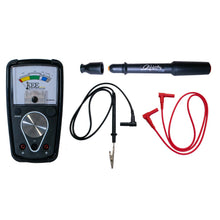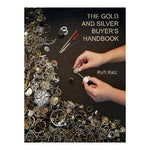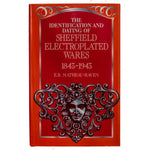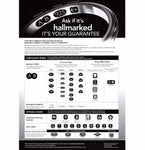
Pickup available from Quicktest (WD18 8JA)
Email us
or call on 01923-220206 for appointment.
Summary
In stock and available for immediate UK dispatch (unlike other suppliers, we don't take your money then order it from overseas!). Includes pen-probe.
Making it with a simple analogue meter seems to have solved the problems found with 'computerised' electronic gold testers. This is definitely the most reliable electronic tester we have seen.
The price does not include a sample of 18ct and 22ct. If you deal in jewellery you will have these - if not, you will need the 18ct sample for testing general jewellery; plus the 22ct sample if you want to test above 18ct accurately.
Guarantee: 1 year
Detail
- Size 90 X 170 X 50mm (3.5 X 7 X 2 inches)
- No acids involved, the probe contains a harmless salt solution.
- Tests gold from 8ct to 24ct (the scale is marked "K" instead of "ct" because it's American)
- The pen-probe provides up to 3000 tests.
- Simple analogue meter, good reliability
- Simply touch pen probe to the item, result is shown in 2 or 3 seconds, very fast
- Includes extra contact leads for large items that will not fit on the test-plate.
- Easy calibration with a sample of 18ct (+ a sample of 22ct gold if you want to test above 18ct accurately) - not included in the price of the tester
- As with every tester (whether you spend £15.00 or £12,000.00) it only tests the surface. This means you must file the surface with a fine needle-file (supplied with each tester) in a place where it won't show, to remove any surface plating.
INCLUDED:
- Battery
- Diamond-impregnated file
- Very clear illustrated instruction booklet written by QUICKTEST
- An extra set of leads for testing very large items that will not fit on the test-plate (though we have never known anyone who has needed to use these).
White Metals
SUMMARY
The KEE tester works best on yellow gold. On white gold It will (providing the item is filed thoroughly) tell you if it is gold but will not necessarily give an accurate carat reading; it will also (providing the item is filed thoroughly) tell you if it is platinum.
DETAIL
Silver reads as not gold.
Steel or tungsten can read as high-carat or as platinum if it is not filed first; once filed it should read not gold.
White gold with a high nickel content will give a reading that is too low; white gold containing Palladium, or with a high silver content, will give a reading that is too high.
Pure Palladium will read somewhere between 18ct an 24ct (be suspicious, 22ct+ gold an only be yellow).
Rhodium is used as a plating to improve the colour of the gold. If you don’t file it, it will test as platinum; if you file it slightly, the tester will pick up both rhodium and gold and the reading will be too high; if you file it thoroughly, the test will be more accurate.
Extras
Also included, the following free gifts (these don't come as 'standard'):
- Carrying pouch
- Mini hallmark chart
- Gold-polishing cloth
and you will have the option of selecting a free gift! (online orders only).
OPTIONAL EXTRAS:
A pen-probe is included, if you want a spare, select it from "Optional Extras".
To test 9ct to 22ct you will need a sample of 18ct yellow gold (it must be exactly 18ct). This is to 'match' the electronics in the tester to the carat (technical term: calibrate). You cannot use the tester without this.
If you want to test 20ct to 24ct accurately you will also need a sample of exactly 22ct.
You can use anything with a UK hallmark or you can add one (or both) calibration samples to your order, click on View Optional Extras.
UK traders will already have hallmarked items, which is why we don't include the calibration samples in the price of the tester.
Reliability
The tester is guaranteed for one year.
- the level of returns is 2%, of which half turn out not be faulty at all (used-up probe, flat battery, out of calibration).
- we do find that many are faulty when we receive them from the supplier in the USA. We return these to the supplier, we do not sell them. Unlike other companies, we open and test every one thoroughly That's why we have such a low level or returns; that's why we have such good feedback.
Pen-probe
A pen-probe is included with your purchase, if you want a spare, click on View Optional Extras. A pen-probe is guaranteed for one month.
The pen-probe is like a felt pen, if you don't replace the cap firmly it dries out. The manufacturers say it will give "up to a few thousand tests" (which could mean any number less than this). They also say it should be replaced after a year (a year from the date on its sticker).
Comments from customers:
- The KEE tests on average about 40 items a day and the probe lasts about 6 months, 5000 tests. The solution in the probe outlasts the tip which becomes soiled from testing scrap. We replace the probe when reliability drifts and more regular calibration is required with our 18ct control sample.
- We get around 3 months and test around 10 times a day, often 15 times a day. Overall we think they last well.
- Our probe only lasted 3 months, we are very disappointed.
-
It's variable, some probes last approximately 12- 18 months each (about 2000 tests) and some 9 - 12 months (about 1000 tests).
- The probes seem to last us at least a year, I would say that it was at least 200 individual tests, and perhaps even up to 400 tests over that period.
- Sometimes a probe lasts a few months but sometimes only a few weeks.
Conclusion:
- Generally, a pen-probe lasts between 3 and 18 months but it can be as long as 2 years or as short as 6 weeks - the guaranteed is one month from the date of purchase.
- Although the manufacturers recommend you change it after a year, if it's still working, it's fine. Providing you are still able to calibrated the tester, you will get accurate results.
- The date on the sticker on the pen-probe is so that we know which batch it comes from and so that you have an idea when it's getting to be a year old. Irrespective of the date on the sticker, the guarantee is one month from the date you purchased it.
Disclaimer
All testers must be used in conjunction with the user's skill, knowledge and experience. Under no circumstances shall QUICKTEST be liable for direct or indirect loss sustained in connection with any item. Nothing is 100% accurate, you must understand the limitations of any tester you buy. Full support given for items you buy from QUICKTEST.
More information
Click here for more details and a review
Click here if you already have a KEE tester and need a replacement pen-probe.
Click here see how easy it is to use, download a copy of the instruction manual (.pdf). Compare this with the instructions for other electronic testers!
Free gift details
If you would like one of the following free gifts with this product, select one from “Select your free gift” above.
QUESTIONS & ANSWERS
Ask a Question-
Hi I am interested in this machine but it seems to only shown starting from 10 carat up to 24 carat on the display, as you know a lot of uk jewellery is 9 carat, how does it identify this if there is no 9 carat display on the machine?
Anywhere in the "10Kt" (yellow) section of the meter means 9ct, the needle might settle towards the bottom - but anywhere in this section indicates 9ct.
The Kee tester is made for the American market. They have 10ct rather than 9ct, and also they spell carat (ct) "karat (Kt)". -
Soo Does this Test Just Check the Surface of the Gold? or does it Check the Gold All the way thru?...Like a Gold Bar...Because knowing just the Surface is nothing and not Worth $350 just to know the Surface when it could be Heavy Plated..
All electronic gold testers (i.e. that tell you the carat) only test the surface; you must file the surface with a fine file (included) so that you are testing below the surface. There are no exceptions, this applies to the inexpensive electronic gold testers (£450.00) and it also applies to the XRF testers ("cheap" models from £12,000.00, "good" models £40,000.00) and it also applies to acids (about £50.00 per set).
If you ONLY deal with gold bars, get an ultrasound detector, this will tell you if the bar is the same all the way through or if there's another metal in the middle. These will not tell you if the bar is gold, it is not a gold tester (and they cost about £1000.00, and I see you say a tester is 'not worth $350.00"). -
Hallo, Can you calibrated I want to test 18k 21k 22k
We calibrate these before dispatch for ALL carats (9ct to 24ct).
As the fluid in the pen gets used up you will have to keep calibrating it yourself but, to begin with, it's all checked and calibrated and ready to go, you dont' have to do anything, it will work from 9ct to 24ct. -
Does the Kee test all the way through a gold sample or just part the way through?
Electronic gold testers (of any type, any make) do not test all the way though the gold; neither do they test partway through, they just test the surface. That is why you must file the surface first (a fine needle-file is included with the tester) to remove any gold plating.
An ultrasound tester will tell you if an item is the same all the way through or if it is 'filled' with another metal in the middle. They are used on coins and bars. They are advertised as 'gold testers' because if you have what looks like a gold bar or a gold coin, you will assume the 'outside' is gold, and you might want to know if it is contains a totally different metal in the middle, HOWEVER, and ultrasound tester will ONLY tell you if you have a metal object with another metal hidden in the middle, it will not tell you if any of it is gold! We do not sell ultrasound testers. -
Can the KEE electronic gold tester be used straight away to test up to 9ct anything higher will need to be calibrated with 18ct - 22ct.?
It is supplied thoroughly tested and calibrated, it can be used straight away to test any carat.
Unlike other brands, you are not required to calibrate it every time you use it.
As the fluid in the pen-probe gets used up, the readings become inacurate and then you have to keep calibrating it (you will need a calibration sample, calibration takes about about 5 seconds).
Obviously, we recommend getting a calibration sample (either from us, or any scrap hallmarked item) sooner rather than later.
The calibration sample should be 18ct. You only need a 22ct sample (in addition to the 18ct sample) if you want to test 20ct to 24ct accurately.






